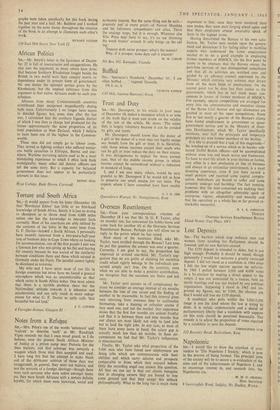African Politics
SIR,—Mr. Smyth's letter in the Spectator of DeCem- ber 25 is full of, inaccuracies and exaggerations. He also uses the argument, as many others have done, that because Southern Rhodesians fought beside the British in two world wars their country merits in- dependence under its present form of government. No one denies the splendid service given by the Rhodesians; but the implied inference from this argument is that native Africans made no such con- tribution.
Africans from many Commonwealth countries contributed their manpower magnificently during both wars. Unfortunately I no longer have access to detailed figures; but, some time after the last war, I calculated that the northern Uganda district of which I was then in charge had produced for the forces approximately the same proportion of its total population as New Zealand, which I believe to have been one of the highest in the Common- wealth.
These men did not simply go to labour corps. They served as fighting soldiers who suffered numer- ous battle casualties in Ethiopia, Burma and else- where. Wartime recruiting safaris used to be a most stimulating experience to which I often look back nostalgically; many other old district officers can tell the same story. But a capacity for balanced government does not appear to be particularly relevant to this issue.
West Cottage, Bude Haven, Cornwall
RENNIE BERE






























 Previous page
Previous page